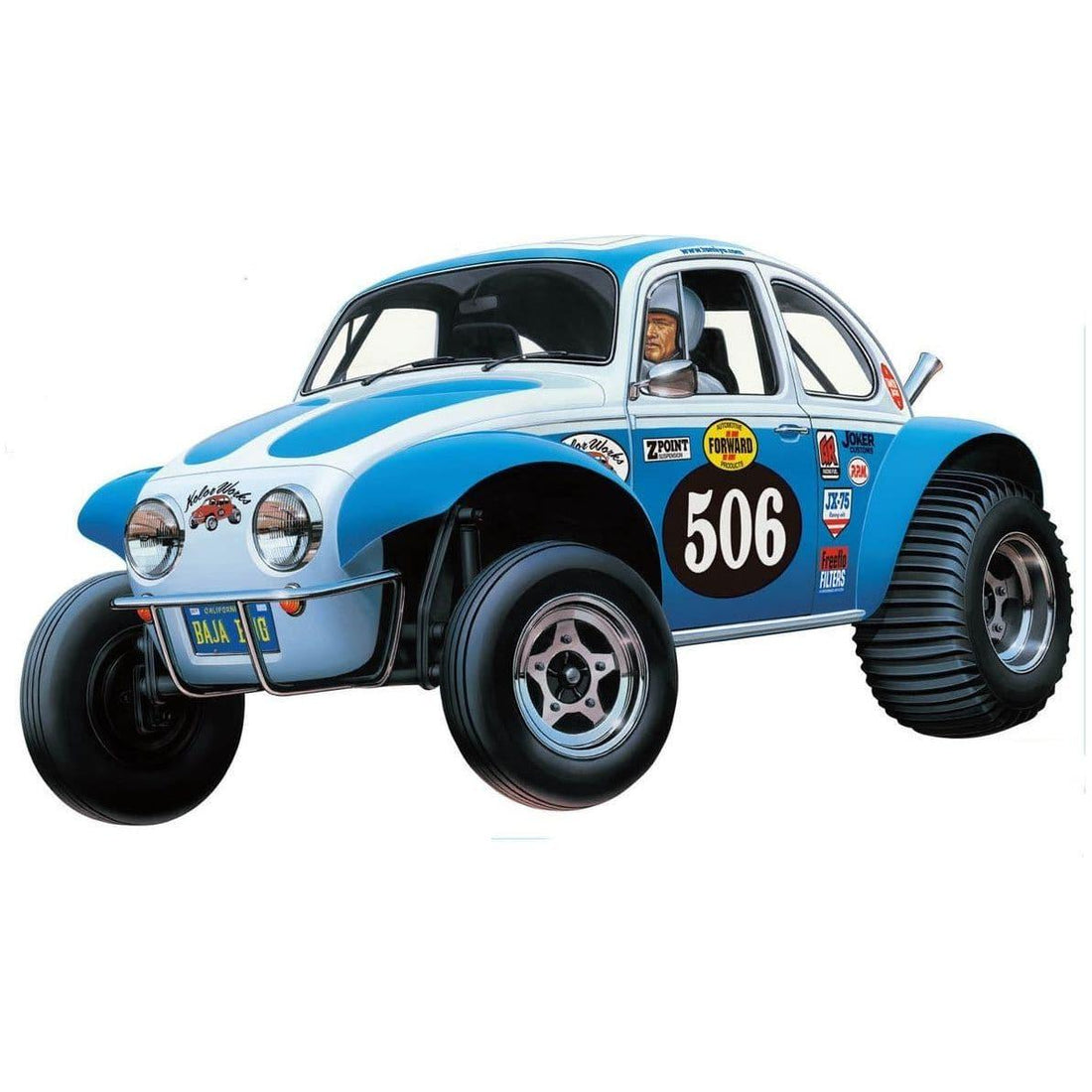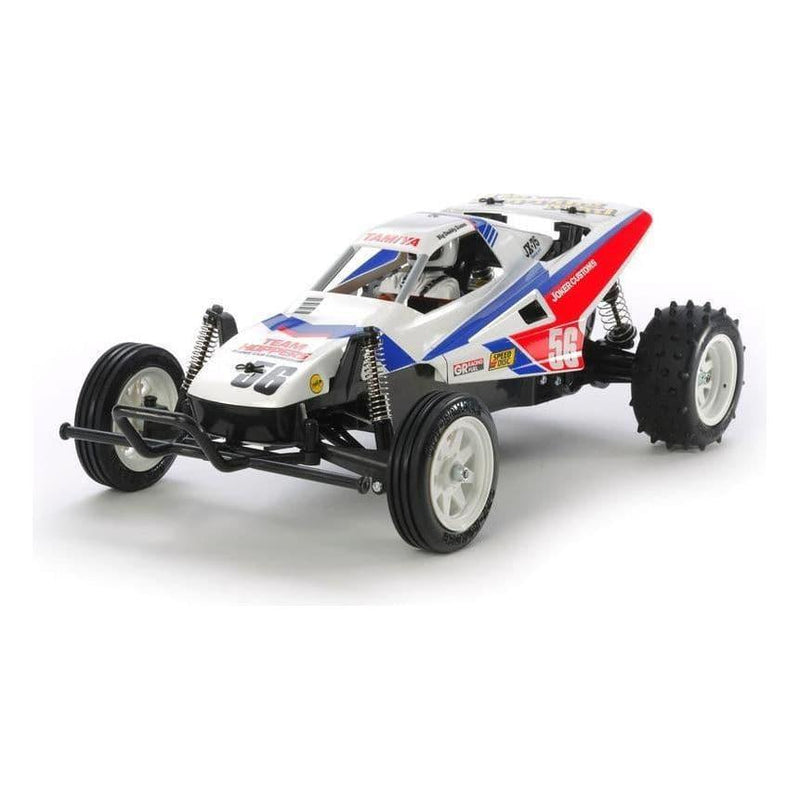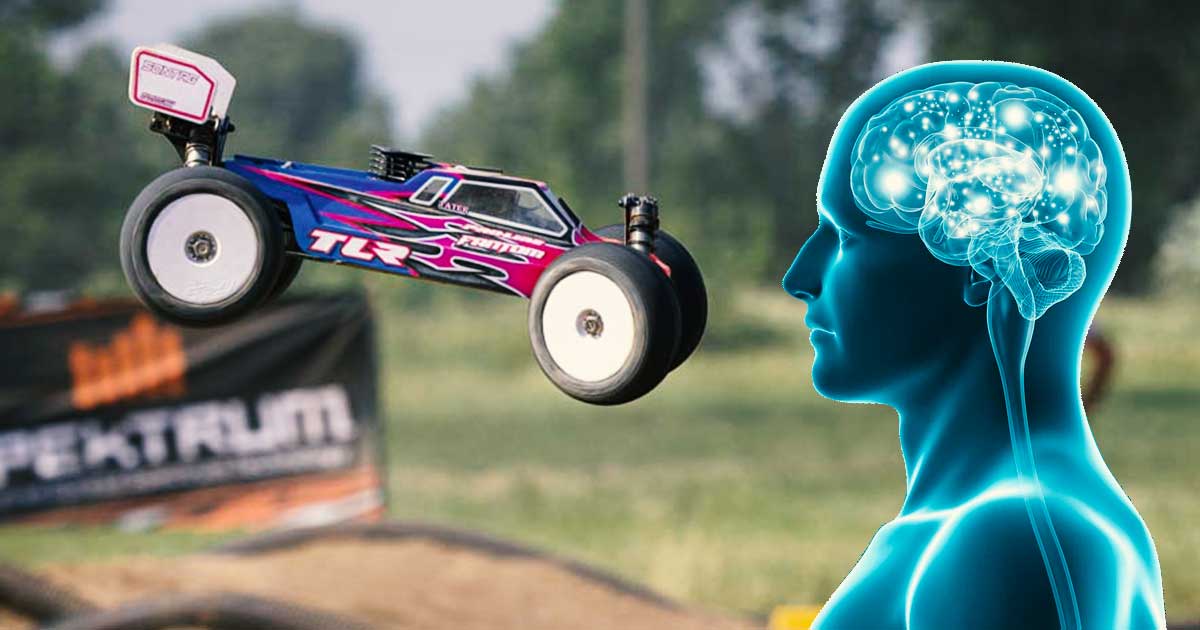The Psychology of Control: How RC Racing Sharpens Your Reflexes and Focus
Discover how remote control racing trains your brain while delivering high-octane thrills
RC racing isn't just about them fancy cars zipping around tracks — it's a proper mental workout of precision, lightning-quick reflexes, and maintaining dead-set control. Whether ya steering a sleek 1/10 on-road RTR car or fiddling with a serious off-road race kit, this hobby challenges your grey matter just as much as your technical know-how. Behind all the noise of them brushless motors and the excitement of high-speed cornering, there's this psychological edge that makes your focus sharper, your reactions quicker, and changes how you handle yourself under pressure.
| RC Racing Psychology at a Glance | |
|---|---|
| Understanding Control | How your physical control over RC vehicles reflects deeper mental control — exploring the connection between brain, hands, and machine. |
| Reflex Training | How repeated racing practice and obstacle challenges speed up your decision-making and improve motor coordination skills. |
| Focus Under Pressure | The importance of maintaining mental clarity during high-stakes racing moments — and how RC racing helps develop this skill. |
| Confidence Building | The long-term psychological benefits of consistent practice and disciplined racing habits. |
| Mental Performance Tools | How your gear — like advanced radios or brushless motors — can be optimised to support your mental performance. |
| Getting Started | Best entry points for beginners, featuring our range of RC RTR cars and top brands like Traxxas, Losi, and ARRMA. |
Stick with us as we break down how RC racing doesn't just make your cars faster — it makes your brain sharper too. Let's take a proper look at how every lap around the track is also exercising what's between your ears.
Understanding Control in RC Racing
Mastering RC racing starts with understanding control — not just over your vehicle, but over your mental state too. At high speeds, even the tiniest movements on your transmitter create precise reactions in your car. That physical connection between your brain and machine is the foundation of cognitive control. The more ya race, the more natural your responses become, reinforcing neuroplasticity and sharpening your brain's capacity to focus and adapt quickly.
When you're navigating a tight corner with a race on-road kit or smashing through jumps with an off-road setup, your processing speed improves. Your brain is calculating distance, speed, and timing all at once — sometimes without you even realising it's happening.

Most RC drivers notice they get better at predicting how their car will behave in different situations over time. This isnt just luck — it's your brain building neuro pathways that associate visual cues with specific hand movements. The technical term for this is 'procedural memory development', but us hobby enthusiasts just call it 'getting dialled in'.
RC racing creates a unique environment where you're forced to:
- Make split-second decisions under pressure
- Adjust strategy based on changing track conditions
- Maintain calm when things get chaotic
- Process multiple visual inputs simultaneously
Did You Know?
Racing simulations are used in cognitive research because they effectively measure a person's ability to maintain focus while managing complex tasks. RC racing provides similar cognitive benefits but with the added dimension of real-world physics and tactile feedback.
Whether you're running a zippy drift car or a powerful monster truck, each vehicle type demands different mental skills. Drift cars require smooth, precise inputs and anticipation, while monster trucks might need more aggressive throttle control and spatial awareness for jumps. This variety means you're constantly adapting your mental approach to match your machine.
Reflex Training Through Repetition
The brain responds brilliantly to repetition — and RC racing is a masterclass in repetitive yet dynamic training. Every lap you drive enhances your hand-eye coordination, reaction time, and spatial judgement. You're not just wiggling your thumbs about; you're creating rapid feedback loops between what you see, what you reckon will happen, and what you do next.
"The faster you can think, the slower everything else feels. That's the advantage that separates top RC racers from the pack."
If you're running a brushless-powered setup, the responsiveness is even sharper — which means the feedback loop between your brain and your car gets tighter. That's where true skill begins to form.

Recommended Setups for Skill Development
| Purpose | Suggested Category | Why It Works |
|---|---|---|
| Beginner Reflex Training | RTR Cars & Trucks | Predictable handling allows you to focus on developing basic timing and control |
| Intermediate Coordination | Drift Cars | Teaches precise throttle and steering control under challenging conditions |
| Advanced Reaction Building | YOKOMO Offroad Kits | High-speed performance demands split-second adjustments and prediction |
When you're learning to race, your brain builds what neuroscientists call 'anticipatory reflexes'. These arent normal reflexes that happen after something occurs — they're predictive movements that happen before obstacles appear. If you've ever found yourself steering around a corner before you fully see it, or lifting off the throttle before a jump, that's your brain getting smarter about racing.
A good way to improve these reflexes is to set up small training circuits with your Traxxas or Losi vehicles. Create slalom courses with household objects or time yourself navigating specific routes. These focused drills improve your reaction time more effectively than just random driving.
Focus Under Pressure
RC racing throws distractions at you left, right and centre — changing terrain, other competitors, unpredictable weather. Staying focused in these situations trains your brain to maintain clarity and emotional control. This mental endurance is similar to what athletes and pilots need in high-stress situations.

Tools like advanced transmitters let you dial in sensitivity, giving you more control in tight races. When your gear is properly tuned, your mind can focus on strategy instead of just trying to keep the car on the track.
Focus in RC racing comes in three forms:
- Sustained attention – Keeping your mind on the task during an entire race
- Selective attention – Filtering out irrelevant distractions around the track
- Divided attention – Monitoring multiple aspects simultaneously (car position, competitors, battery life)
Most racers report that their ability to concentrate improves dramatically after a few months of regular RC racing. The hobby demands a particular type of alert calmness that transfers well to other areas of life. One of our customers who works as an air traffic controller noticed his work performance improved after taking up 1/10 on-road racing as a weekend hobby.
Focus-Building Racing Exercises
- Battery Optimisation Challenge: Practice completing the maximum number of laps on a single battery charge with your RTR car, forcing you to find the perfect balance of speed and efficiency
- Line Precision Training: Set up a narrow lane with tape and practice maintaining perfect lines without touching the boundaries
- Consistency Drills: Time five consecutive laps and try to keep the times within 0.5 seconds of each other
The concentration skills developed through RC racing are particularly valuable in our distraction-filled world. Many racers find that the hobby provides a form of 'active meditation' where they become completely absorbed in the present moment. This state of flow isn't just enjoyable — it's cognitively restorative.
Building Confidence and Discipline
The more you race, the more confident you become. But that confidence isn't just pulled out of thin air — it's built on repetition, making mistakes, and adapting your approach. Discipline becomes essential too — maintaining your RC vehicles, following practice routines, and tracking your performance. These behaviours strengthen long-term thinking and develop a growth mindset.
RC racing isn't just a weekend thrill. For serious enthusiasts, it's a structured mental programme that rewards dedication. Here's how racing builds psychological resilience:
The Confidence Cycle in RC Racing
- Challenge: Attempt a difficult racing technique or faster lap time
- Struggle: Experience initial difficulty and setbacks
- Persistence: Continue practicing despite failures
- Breakthrough: Master the technique or achieve the goal
- Confidence: Gain increased self-belief that transfers to new challenges
This cycle repeats with increasingly difficult challenges, gradually building what psychologists call 'competence-based confidence' — the most stable form of self-assurance because it's based on actual skills you've developed.
The most valuable aspect of RC racing isn't the win — it's the mental toughness you develop when your car flips, breaks, or gets outpaced, and you choose to keep improving anyway.
For younger racers, RC hobbies provide structured ways to learn about consequences and delayed gratification. Proper maintenance of Traxxas or ARRMA vehicles teaches that care and preparation lead to better performance — a lesson that applies well beyond the track.
If you're new to the hobby, explore our brands directory to find a setup that matches your goals and personal style.
Tools to Boost Mental Performance
Having the right hardware doesn't just improve your car's performance — it reduces your cognitive load too. If you're constantly troubleshooting or second-guessing your setup, you're wasting mental energy that could be used for racing strategy. Smart choices in your gear free up your mind to think tactically, adapt quickly, and ultimately win more races.
| Equipment Impact on Mental Performance | |
|---|---|
| Quality Transmitters | Precision controls reduce mental effort needed for basic movements, allowing focus on racing lines and strategy |
| Brushless Motors | Consistent power delivery creates predictable handling, helping you build reliable mental models of how your car will respond |
| Quality Tyres | Appropriate compounds for your racing surface reduce unpredictable slides, allowing more confident driving |
| High-Performance Batteries | Reliable power eliminates anxiety about unexpected cutouts, letting you concentrate fully on competition |
Different brands design their vehicles with different philosophies that can match your mental approach to racing:
- Traxxas vehicles are known for user-friendly design — ideal for maintaing mental focus during competition without technical distractions
- Losi kits cater to racers looking for ultimate adjustability and competitive performance
- Drift cars help improve fine-tuned steering control — excellent for developing reflex precision and finesse
The psychological concept of 'tool extension' explains why quality equipment matters so much in RC racing. When your transmitter and vehicle respond exactly as expected, they effectively become extensions of your own body in your brain's perception. This seamless connection between intention and action is what creates the immersive flow state that many racers describe as "being one with the car."
Pro Tip:
Set up your radio transmitter with consistent settings across your different vehicles. This consistency creates a reliable mental interface, reducing the cognitive effort needed when switching between cars.
Regular maintenance routines also support mental performance by eliminating uncertainty. When you know your ARRMA or Traxxas vehicle has been properly checked before a race, you can focus entirely on driving instead of worrying about potential mechanical failures.
Getting Started
If you're keen to start training your brain through racing, you don't need to dive straight into pro-level kits. Begin with a reliable RTR (Ready-To-Run) model, then work your way up through upgrade paths and different race classes as your skills improve.
For absolute beginners, we recommend these pathways:
- Start with: Entry-level RTR vehicle (1/10 scale)
- Practice in: Open spaces like empty car parks or sports fields
- Focus on: Basic control skills and completing full turns without overcorrecting
- Advance to: Setting up simple obstacle courses with household items
- Later consider: Joining casual meetups or club racing events
The mental benefits of RC racing begin to appear after just a few weeks of regular practice. Many newcomers report improved hand-eye coordination and better concentration within the first month. The key is consistency — even 30 minutes of focused practice a few times a week will yield noticeable cognitive improvements.
The journey from beginner to skilled RC racer isn't just about faster lap times — it's about developing a sharper, more responsive mind that performs better under pressure.
As your skills grow, you might notice improvements in:
- Spatial awareness and depth perception
- Ability to predict motion and trajectories
- Multi-tasking capacity while maintaining focus
- Emotional regulation during high-pressure situations
- Problem-solving speed when facing obstacles
Need help choosing the right fit for your personal learning style? Browse our full RC collection at Hearns Hobbies, or reach out directly through our Contact Page for personalised recommendations.
Frequently Asked Questions
How long does it take to notice cognitive benefits from RC racing?
Most newcomers report improved hand-eye coordination and better concentration within the first month. Even just 30 minutes of focused practice a few times a week will yield noticeable cognitive improvements. The key is consistency — stick with it, and ya mind will sharpen right up alongside your racing skills.
Is RC racing suitable for kids as a brain-training activity?
Absolutely! RC racing is brilliant for younger enthusiasts. It provides structured ways to learn about consequences and delayed gratification. Proper maintenance of Traxxas or ARRMA vehicles teaches that care and preparation lead to better performance — a lesson that applies well beyond the track. Just start them with more durable RTR models that can handle a beginner's mishaps.
What's the best RC vehicle to start with for improving reflexes?
For reflex training, start with a standard RTR car or truck at 1/10 scale. These vehicles offer predictable handling that allows you to focus on developing basic timing and control. Once you've got the basics sorted, you might consider advancing to drift cars for intermediate coordination challenges, which teach precise throttle and steering control under more demanding conditions.
Can RC racing actually improve my focus in other areas of life?
Dead-set it can! Many racers report that their ability to concentrate improves dramatically in other areas after a few months of regular RC racing. The hobby demands a particular type of alert calmness that transfers well to work, study, and other activities requiring sustained attention. One of our customers who works as an air traffic controller noticed his work performance improved after taking up 1/10 on-road racing as a weekend hobby.
How do I find local RC racing communities to practice with?
Finding your local RC community is easier than you might think. Start by checking with your nearest hobby shop for information about club meets and track days. Many shops host regular events or can point you toward active groups. Social media platforms also have dedicated RC racing groups where locals coordinate casual meetups. These communities are typically dead friendly to newcomers and love sharing their knowledge and passion for the hobby.
Conclusion: More Than Just Toy Cars
RC racing isn't just about the adrenaline rush of watching your mini machine tear around the track — it's a proper workout for your grey matter. Through the precise control, lightning-quick decisions, and sustained focus required to race effectively, you're building neural pathways that serve you well beyond the hobby itself.
The psychological benefits we've explored — improved reflexes, enhanced focus, better emotional regulation, and increased confidence — make RC racing a rare find in the world of hobbies: something that's both ridiculously fun and genuinely good for your cognitive development.
Ready to Get Started?
Whether you're after the technical challenge of building a race kit or the immediate thrill of an RTR vehicle, your brain will thank you for taking up this engaging hobby. Start small, be consistent with your practice, and don't be afraid to push your limits. Remember — every lap is making your mind sharper, your reactions quicker, and your focus stronger.
 is here! Shop now, pay later in 4 easy installments
is here! Shop now, pay later in 4 easy installments

